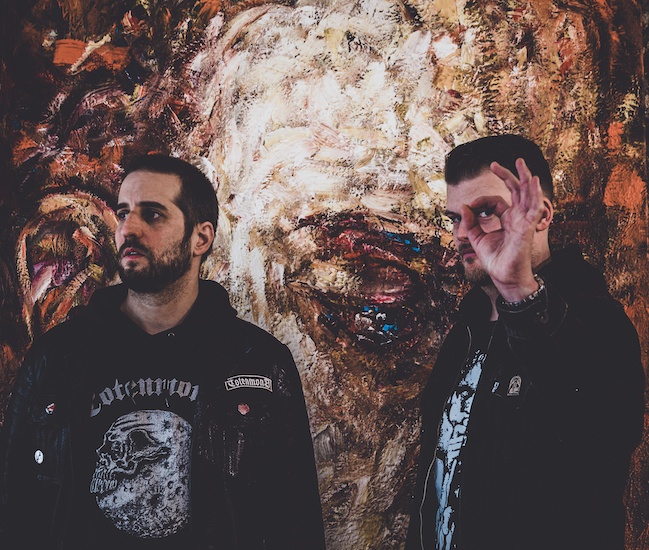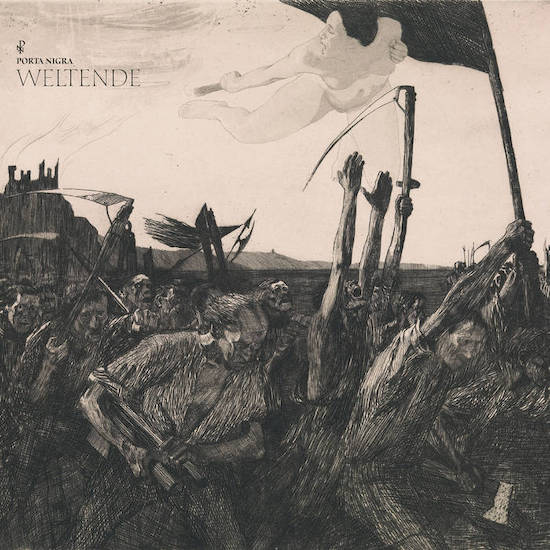
(In July of this year Soulseller Records released Weltende, a new album by the German extreme metal band Porta Nigra. It led Comrade Aleks to contact the band, and the following interview with guitarist/bassist Gilles deRais was the result.)
German band Porta Nigra is labeled as “avant-garde black metal”, and it seems to be truth. It was founded in 2010 by Gilles deRais (guitars, bass) and O. (drums, vocals), who recorded two full-length albums as a duo. But sometime after, Porta Nigra turned into the full band, and now they’ve returned come with the fourth full-length album Weltende.
This authentic material has a rich cultural background, rooted in both Belle Époque and Fin de Siècle, so don’t expect an ordinary black metal deviltry from this band. We tried to learn more about Porta Nigra and Weltende from Gilles deRais and in some way we succeeded.
(The interview was initially done for the Spanish magazine This Is Metal, and I’m glad to share its full version here.)
******
Hi Gilles de Rais! Accept my congratulations for Soulseller Records release of your fourth album Weltende just a month ago, and this new material is damn energetic, eclectic and grim. But first of all, Porta Nigra (“black gate”) is a large Roman city gate in Trier, but the band is based in Koblenz, Rhineland-Palatinate. Why did you choose such a name for the band?
Very pragmatic reasons because I like the sound of it, the words are not overly used and it’s open for many interpretations. A name is a name and what really matters is the content, that gives the name a “reason” and “feeling”.
The band is tagged as a “black metal” group, though the range of your influences seems to be wider. In one of your interviews, you mentioned that you aren’t very fond of “Orthodox Black Metal” — what turns you away from this genre?
I grew up with 1990s Black Metal when the content was really strong. When so-called “orthodox” black metal came around, I had the feeling it was more about gimmicks, costumes and image than music. Most music was damn boring and as a very anti-religious person I did not get the idea to be almost only inspired by the bible or other hocus-pocus.
Originally black metal served a purpose of channeling raw emotions like hatred, rage, depression sometimes. But your music is more theatrical and dramatic. Which qualities of black metal do you feel useful in your case?
The almost visual, three-dimensional experience through the music and the drama of course. I like drama, when it’s a real human experience and not a pseudo shocking image. Of course musically parts of it fit very well with my vision for Porta Nigra: most important the tremolo riffing that still inspires me.
What was your original vision of new material when you started to write the first songs for Weltende? What kind of key elements did you seek to embody in this record?
I for sure did not want to make another streamlined black metal album and wanted to be more free and go back a little to the “eclectic” style of the first two albums. I like to mix all sorts of stuff, Doom, Thrash, a little Industrial, Black Metal, Heavy Metal, solos over a blastbeat… whatever is there it works for me. I am bored easily so I need stuff to happen in my music.
There’s a new member in the band, Jöschu Käser, and he’s 25. How did you meet each other? How comfortable was it to build a collaboration inside the band with him?
I met him through a mutual friend. He is not only incredibly talented but also very, very energetic and… fast. It was a real pleasure and I hope we will work together again.

You took Käthe Kollwitz’ painting dedicated to the Peasant War in Germany as Weltende’s artwork, but I read that the album’s lyrics don’t deal with this topic. Why did you choose this painting and avoid raising this theme in your songs?
Like the bandname it is just a picture. The historic content is not that important. Important is the feeling of distress, war and struggle that the picture represents. If you want a link to the context of our album you can look at Kollwitz’ biography.
So, in Weltende, you use the artwork of one of most well-known German expressionists; you use samples of Austrian actor Oskar Werner reading expressionists’ lyrics at a festival in 1981; and the album’s concept is based on the fate of expressionist writers that died in the First World War. How did you manage to entwine all of these themes in your album? How does it work for you?
It’s really not that hard but rather logical if you look at our discography. We have always been stuck in these historical times, the turn of the 19th to 20th century. The expressionists however never played a role in our oeuvre even though these works are very important to me. So I got all my books, read through them, and suddenly saw what I wanted to create with Weltende: Some kind of homage to these people in the context of extreme metal.
What is your own cultural background? When did you absorb all these layers of the past culture?
I was born in north Germany but have lived in many areas in this country. I traveled quite a bit and am open-minded considering people and music. I studied German literature in the beautiful city of Bamberg and now reside in the Rhine-area, basically middle-west of Germany. I grew up with Black Metal, played in a Black Metal band but was never really a part of that scene and have a deep interest in all sorts of music. Hence maybe the diverse style of my band.
As I understand, all of Porta Nigra’s albums are connected with different aspects of European culture and history, “Fin de Siècle” as you revealed in the title of the first album. What attracts you to this historical period?
When I started this band I wanted to channel ugly feelings through my music but not really speak about my everyday-life. So I used these old spirits and speak through them, as I could very much connect to their feelings and expressions. Like time traveling. Leaving this reality and going to another spot in history and talking to people who are very different, deal with very different problems than you, but in essence are also very similar.
For instance: What was for them industrialization and urbanization was for me the technological development that came with social media. Huge shifts in our development, not always positive for every human being.
Can you name the writers to whom you dedicated Weltende?
Jakob van Hoddis, Georg Trakl, Georg Heym, Gustav Sack, Gottfried Benn.
Which current German black metal bands do you find interesting as a fan of extreme music?
None.
You were the member of Membaris from 1999 to 2012. What didn’t work with this band? What drove you to create Porta Nigra?
Creative differences as well as some personal stuff. All good now. They still exist and I still meet the guys. I guess I wanted out of the typical Black Metal environment.
Thanks for the interview. Did we miss some important topics? And what are your plans for the rest of 2023?
Thanks. Check out the new album. I am already working on new music and some (hopefully) drastic changes.
http://www.facebook.com/PortaNigraBand
https://soulsellerrecords.bandcamp.com/album/weltende
https://portanigra.bandcamp.com/album/kaiserschnitt
